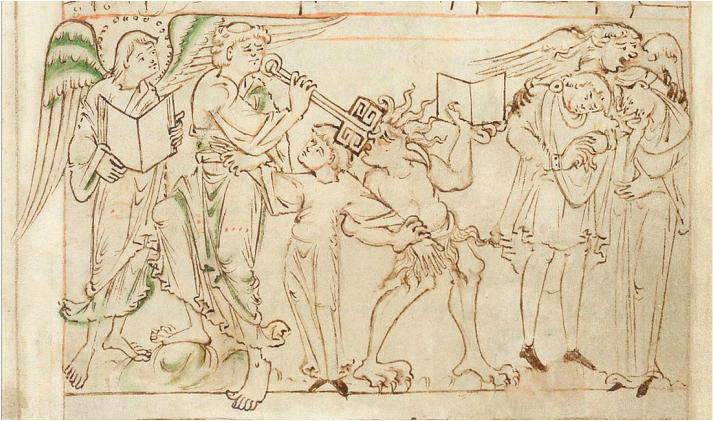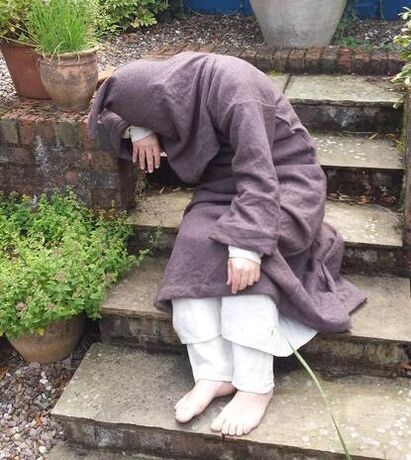|
Blessed twenty-first century readers, I hear so many accounts of reckless wrath and inveterate ire in your world that I thought it was time for us all to take a meditative look back at anger in early medieval England. And being as I have tirelessly worked to maintain an exemplary manner of life, worthy of imitation in matters of self-control, it really is the least I could do for you all as your transhistorical spiritual adviser. To enable me in this most conscientious of endeavours, I have managed, with great tact and diplomacy, to engage the philological services of Rolf Bremmer, eminent master of words and, it would seem, professor of Anglo-Saxon fury! Please enjoy the interview below... only do make allowances for the odd moment of righteous indignation.  Professor Rolf Bremmer and his goat. Image courtesy of Rolf Bremmer. Professor Rolf Bremmer and his goat. Image courtesy of Rolf Bremmer. ASM: Welcome, Professor, it’s a great pleasure to interview you. RB: Thank you, brother, for your welcome but whether this interview will be a pleasure is yet to be seen. Praise the fair day at even! Be that as it may, it is quite a new experience for me to be subjected to a series of scrutinising questions posed by a tonsured man. ASM: I will scrutinise with the utmost monastic discretion, Professor. May I begin by asking you to tell my blessed readers a little bit about yourself. So what area of scholarship do you specialise in? RB: I am a professor of English Philology at the University of Leiden, the Netherlands. The term philology perhaps needs some explanation as it is not so current any longer in your country and has even acquired a rather negative connotation, if I’m right. ASM: Well, I’m not really sure that philology was ever that eleventh-century Anglo-Saxon, but then I did have a rather selective education, you know. RB: Well, did you now? Who was your magister? Didn’t he discuss with you in class, interlinear glosses and all, that famous work of Martianus Capella, De nuptiis Philologiae et Mercurii, a.k.a. ‘The Marriage of Lady Philology and Sir Mercury’? Hot stuff! Or were you in the infirmary, perhaps, at the time? ASM: Well, I do tend towards the sickly, Professor, so that may very well explain this serious deficit in my understanding. But, please, continue. RB: For me, philology implies an approach to older, ‘dead’ stages of a language in order to wring out all possible meanings of words. In my case, these older stages concern Old English [think Beowulf, blessed readers] and Middle English [think, roughly, Chaucer, beloved] in my teaching, but Old English also in my research. Philology is a kind of 360 degrees, all-round probing of a text: How much information can be culled from it? What is the etymology of the words that make up a text? What is its dialect? Philology is critically scrutinizing meanings, possibilities. Brought to a first flourishing maturity by the Renaissance humanists, it was carried to great heights in the nineteenth century – are you still with me, brother? ASM: Oh, of course, Professor. Nineteenth century. RB: Philology, you might say, is the mother of modern humanities. But some children (please allow me to pursue the metaphor) outgrow their mother: popular literary theories have sometimes drifted far away from their cradle. ASM: That sounds a bit dangerous to me. RB: To mention a notorious example from Old English literature: the epic Beowulf. One of the most persistent questions that have been raised in Beowulf studies concerns the date of composition. The problem cannot be solved by taking a narrow approach, but only if historical linguistics, metrics, palaeography, archaeology, cultural-historical anthropology – to mention some important sub-disciplines – are brought to bear on the interpretation. ASM: I see. That seems reasonable. Now, I hear you have a special interest in the subject of the emotion of anger and the Anglo-Saxons. Would you mind saying a few words about how you got interested in this? And please let us know if you think the Anglo-Saxons have a particular issue with this deadly sin. RB: Yes, brother, you are quite right. I have recently published an article on anger in Anglo-Saxon England. The piece had actually been in the pipeline for quite some time, for it grew out of the Toller Lecture that I delivered at the University of Manchester in 2010. ASM: Ah, the university of my alter ego, Dr Monk. I think he may have skipped that lecture. [A quizzical look from the professor.] RB: I really have to think hard to recall when I started to get interested in the subject, but come to think of it, I owe it to my regularly attending the annual Congress of Medieval Studies in Kalamazoo [Michigan, USA]. One of this congress’s many attractions is the extensive offer of a wide range of books, old and new, on anything medieval. Each time I am there I say a little prayer not to succumb to the sin of greed, when I see all those abundantly decked book tables and well-stacked bookcases. ASM: I think the Lord would forgive this type of greed, Professor. RB: It must have been on one such occasion that I bought a collection of essays called Anger’s Past: the Social Uses of an Emotion in the Middle Ages [edited by Barbara Rosenwein, 1998]. It contained intriguing illustrations and was very reasonably priced (the latter being a point that Dutchmen particularly appreciate), so the book looked to me a perfect read for my flight back home. There wasn’t much Old or Middle English literature being discussed in it, if at all, it turned out, but I thought I recognised quite a few parallels with Anglo-Saxon textual material. What tickled me especially was a remark that in order to get close to the role and function of emotions in the early Middle Ages, we must begin with a study of the vocabulary. Grist to a philologist’s mill! Did the Anglo-Saxons have a particular issue with anger? I can’t really say, for I haven’t investigated how they related to the other deadly sins. Yet I don’t think the Anglo-Saxons were particularly ireful. On the continent they were notorious for their foolishness (stultitia), while anger was taken to be the national trait of the Britons. But these are stereotypicalisations, don’t you think? ASM: Well, I have no idea how those continentals developed their notion of Anglo-Saxon foolishness. Outrageous, I would say. Of course, anger and the Britons goes without saying. So then, as an expert in Old English language – a philologist of great craft, we might say – would you mind explaining to the readers the range of words associated with the emotion anger in your source material? RB: As for the range of words having to do with anger – the ‘semantic field of anger’, as experts call it – I appeared to be in a lucky situation, for I was able to stand on the shoulders of a Belgian scholar, Caroline Gevaert. ASM: She must have had a robust constitution. [A look of pity flashes over the professor’s face.] RB: She had written her PhD thesis on the Old English words relating to the emotion of anger. ASM: Oh, metaphor! RB: You would be surprised to learn how the complexity of this emotion is reflected in the vocabulary referring to it. Anger, for example, can be expressed in physical terms of temperature (‘red-hot with anger’, ‘boiling, seething with anger’), and of size (‘swollen with anger’). Anger makes one insane (‘mad’), out of plumb (‘cross’), it darkens the mind (‘gloomy’), it perturbs – actually, things haven’t changed much, don’t you think? But Old English had many more words to express these aspects and nuances of anger than English has today. ASM: Well, that doesn't completely surprise me, Professor. We Anglo-Saxons are rarely stuck for words. So what primary source materials have you been looking at in this research? RB: I have cast my net wide and included both prose and poetry: saints’ lives, sermons, chronicles, penitentials, laws and heroic narratives. But what surprised me is that you can find anger also given shape in manuscript illuminations: angry people are typically depicted with their hair haywire. ASM: Never trust the temperament of those with dishevelled hair, that’s what I say. So are there particular genres of Anglo-Saxon literature in which anger is a strong theme?  Peter prods a devil in the face with his key to heaven. The devil is less than pleased, as indicated by his wrathful looking coiffure and matching skirt. The Liber Vitae of Newminster and Hyde, British Library, Stowe 944 (Winchester, c. 1031), folio 7r. PUBLIC DOMAIN: This image is identified by the British Library as free of known copyright restrictions. Please click on the image to go to the source. RB: No, I don’t think you can really say so. Anger is all over the place. ASM: Oh dear! Now, Professor, I simply must get your learned opinion on one particular matter that concerns me greatly, that is, are there certain situations in which it would be defensible for a humble Anglo-Saxon monk to give vent to his anger? RB: This is a tricky one, brother. The Church Fathers were not of one mind in this respect. Some said, yes, every now and then it is salutary to get angry with a sinner, for only then will he mend his ways. Other doctors claimed (with an appeal to one of King David’s psalms) that even in such situations the negative energy of anger estranged a man temporarily from God. So take my advice: steer away from this emotion because it is extremely destructive. Anger made a man unfit for being consecrated as a priest or to receive the Extreme Unction [one of the last rites administered at someone’s death bed]. ASM: Ah, perhaps we should move the discussion on a little. Let’s talk anger and poetry. I have to ask you about the most famous of Anglo-Saxon poetic characters, Beowulf: Do you think he needed to attend anger-management classes? RB: Good question, but no, I don’t think so. In fact, Beowulf was very good in his anger management. He knew when to keep quiet and when to let his anger out. When he encounters Grendel, he is mighty angry, but so is Grendel. Steam is coming from their ears. But the poet does not utter a word of disapproval. On the contrary, it seems that anger is a requirement for a warrior. Wulf Wonreding killed the Swedish King Ongentheow, after he had angrily reached for his sword and had swung it so fiercely that the blood spouted from the veins in the king’s neck. ASM: Ghastly! RB: Also in another heroic poem, The Battle of Maldon, we see that the warriors swell with anger. It gave them the adrenaline, I think, to face death in the eye. Sometimes when I read these combating scenes I have to think of the Incredible Hulk who when getting angry turns from an ordinary man into a greenish, oversized man with an incredible power that makes him invincible. ASM: May the Lord have mercy on us all! What terrible people you must have in your neighbourhood. [Another quizzical look from the professor.] Now, what about women and anger? I know my dear mother, God bless her soul, was not averse to giving me the odd clip around the ear – metaphorically, of course – but is it ever acceptable, or even appropriate, for Anglo-Saxon women to express anger? RB: Here we share similar experiences, brother Anglosaxonicus, because when I was young my mother in her wrath did not spare the rod, that is to say a clothes hanger or even badminton racket, to redden my buttocks. ASM: Badminton? [He hasn’t heard me.] RB: But curiously, perhaps, angry women are hard to find in Anglo-Saxon England in the written record. St Helena, Emperor Constantine’s mother, is one such woman. In a lengthy Old English poem, Cynewulf tells us how she went on a quest to find the cross that Christ had died on. She ends up in Jerusalem but no one can help her and quite understandably so, for no Jew in his right mind – Cynewulf had an anti-Semitic slant typical for the time – would profit from Helena finding the instrument of torture and execution that Christ died on. Their stubborn refusal to help her makes Helena burst out in a fit of anger and she orders the Jews’ spokesman to be tortured until he gives the information she wants. Not a nice woman, one would think today, but in Cynewulf’s eyes she is a hero. ASM: My master deployed similar tactics when I was a young oblate, when trying to get me to confess or dob in my fellow oblates. [A frown this time from the professor.] RB: Helena’s anger is, of course, a product of Cynewulf’s imagination (and of his Latin source), so I am happy to have found a real-life bad-tempered woman, too. ASM: Tell us more, please. RB: It all happened in Herefordshire. One day the district assembly was convening, when forward stepped Edwin, son of Enneawn, and declared before the court that his mother held two estates as her own that were rightly his. The men assembled were rather confused by this bold and unusual claim and decided to send a delegation of three big shots to the (anonymous) mother, apparently a widow, to make inquiries. When these three delegates had explained their business, she made it perfectly clear to them that her son had no right whatsoever to the two estates, and ‘became very furiously angry with her son’ – people in those days always got excessively angry – and disinherited him on the spot. ASM: Well, I never! RB: We know of this incident because one of the three delegates ordered the whole case to be written down on a blank leaf of the Hereford Cathedral Gospelbook. If you’re interested, you can go there and read it there for yourself. ASM: Thank you, Professor, I will take a gander next time I’m allowed out. Now, thinking once more about the poem Beowulf, and still on the subject of women and anger, how do you think Anglo-Saxons should view the anger of Grendel’s mum? Didn’t she have the right to be just a bit angry? RB: Good question. The poet, in any case, is quite keen on framing her as a woman. First of all, when he makes her sneak up to Hrothgar’s hall under cover of nightly darkness. Second, when she bursts into the hall the poet remarks that she makes a very impressive entry, but that she defends herself against her enemies like a woman: not half as brave as a man. Moreover, and this is remarkable I think, whenever men are fighting, whether inside a hall or out on the battlefield, the poet mentions their anger: Beowulf, Grendel, Wulf, even the dragon. But Grendel’s mother is denied the emotion of anger when she bursts into King Hrothgar’s hall to revenge her son. My investigation suggests therefore that anger was a gender thing: women were not generally supposed to be or get angry. Whether this rarity reflects reality or ideal is hard to say, but in view of our own experiences it would seem that women were not supposed to be or get angry. ASM: Someone should have told my mother, bless her soul. Now, a slightly personal question, professor: Do you ever vent your own anger – or righteous indignation – in Old English? RB: Truth to tell, I rarely get angry. But if I do, only a Dutchman would understand my verbal outburst and fathom the depth of my ire. ASM: Intriguing! Now, just bringing this to a conclusion, I’m wondering if your research is going to encourage more studies of Anglo-Saxon ‘emotionology’, for sake of a better term. Should we expect Anglo-Saxon scholarship to get all touchy-feely? RB: Yes, to begin with the latter, I would welcome more Anglo-Saxonists to become aware of the emotions in Anglo-Saxon England. One of the difficulties is that emotions, just like, for instance, gender and ecology, are very much invisible. Emotions pose a challenge to the investigators. But, apparently, emotionology is in the air, for earlier this year saw the publication of a volume devoted entirely to the subject: Anglo-Saxon Emotions. Reading the Heart in Old English Language, Literature and Culture, edited by Alice Jorgenson, Frances McCormack and Jonathan Wilcox. I rejoice in reading it. ASM: I shall share that rejoicing with you, professor. And I must encourage my readers to also look at your own article in the journal The Review of English Studies [link below]. Rather good, I must say. Can we look forward to seeing any further research in this area? Is your quill even now at the ready, Professor? RB: No, I’ve offered my mite and have now turned my attention to, emotion-wise, less unsettling subjects, such as disentangling the sources and purpose of an unpublished glossary in a Leiden manuscript that can be linked to the Canterbury school of Archbishop Theodore and Abbot Hadrian. ASM: Well, I was hoping for something about lust, but an unpublished glossary it is, Professor. And many thanks indeed for being such an obliging interviewee. May the Lord bless you! RB: Swa beo hit!
8 Comments
 Human neutrophil ingesting MRSA. By National Institutes of Health. Public domain via Wikimedia Commons. Human neutrophil ingesting MRSA. By National Institutes of Health. Public domain via Wikimedia Commons. Now, blessed readers, I've still got to wait several hundred years before I get to witness the wizardry of the printing press, so I'm rather excited to tell you all that the American Society for Microbiology has published an Open Access journal article by Dr Freya Harrison and her colleagues concerning the Anglo-Saxon medical remedy that has killed your MRSA 'superbug'. (You can listen to my interview with Dr Christina Lee, a professor of medieval studies, on the same subject.) So for all you twenty-first century physicians and philosophers out there, just click on the link below. Now, where did I put my quill? The Anglo-Saxon Monk is happy to provide his blessed readers with a link to a short film about The AncientBiotics Project: a truly marvellous endeavour to explore the efficacy of an Anglo-Saxon medical recipe against a twenty-first century superbug!
You can see the film via the AncientBiotics Facebook page or directly via YouTube.
|
Details
|




